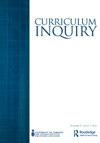“La solidaridad no perence”:波多黎各的社区组织、政治机构和互助
IF 1.6
3区 教育学
Q2 EDUCATION & EDUCATIONAL RESEARCH
引用次数: 1
摘要
摘要飓风玛丽亚过后,为了应对地方和联邦政府的疏忽低效,社区团体和集体、基层组织和多种原因的活动家开始在波多黎各根据互助和团结的原则组织起来,由当地活动家和社区领袖、本科生和一名教授组成的社区组织。这篇文章将集体的四名成员聚集在一起进行对话,他们反思了团结在CCUC组织和项目中的核心作用,以及面对波多黎各的新自由主义紧缩措施,团结作为自决实践的运作方式。我们还强调了在建立CCUC之前所做的关系工作,CCUC使其能够创建。我们还讨论了我们如何通过批判性对话和反思,跨越分歧谈判我们的合作关系,我们的殖民主观主义所带来的挑战,以及我们如何通过其他建立在团结和相互依存基础上的方式来规避殖民逻辑。本文章由计算机程序翻译,如有差异,请以英文原文为准。
“La solidaridad no perece”: Community organizing, political agency, and mutual aid in Puerto Rico
Abstract In the wake of Hurricane Maria and in response to the negligent inefficiency of the local and federal governments, community groups and collectives, grassroots organizations, and activists of multiple causes began organizing under the principles of mutual aid and solidarity in Puerto Rico. One of these is the Colectivo Casco Urbano de Cayey (CCUC), a community organization comprised of local activists and community leaders, undergraduate students, and a professor. This essay brings together four members of the collective in a dialogue where they reflect on the central role of solidarity in the CCUC’s organizing and projects and the ways solidarity operates as a praxis of self-determination in the face of neoliberal austerity measures in Puerto Rico. We also highlight the relational work that was done prior to establishing the CCUC that enabled its creation. We also discuss how we negotiate our collaborative relationship across difference through critical dialogue and reflection, the challenges that arise because of our colonial subjectivities, and the ways we circumvent colonial logics through other ways of being and relating anchored in solidarity and interdependence.
求助全文
通过发布文献求助,成功后即可免费获取论文全文。
去求助
来源期刊

Curriculum Inquiry
EDUCATION & EDUCATIONAL RESEARCH-
CiteScore
3.10
自引率
17.60%
发文量
37
期刊介绍:
Curriculum Inquiry is dedicated to the study of educational research, development, evaluation, and theory. This leading international journal brings together influential academics and researchers from a variety of disciplines around the world to provide expert commentary and lively debate. Articles explore important ideas, issues, trends, and problems in education, and each issue also includes provocative and critically analytical editorials covering topics such as curriculum development, educational policy, and teacher education.
 求助内容:
求助内容: 应助结果提醒方式:
应助结果提醒方式:


